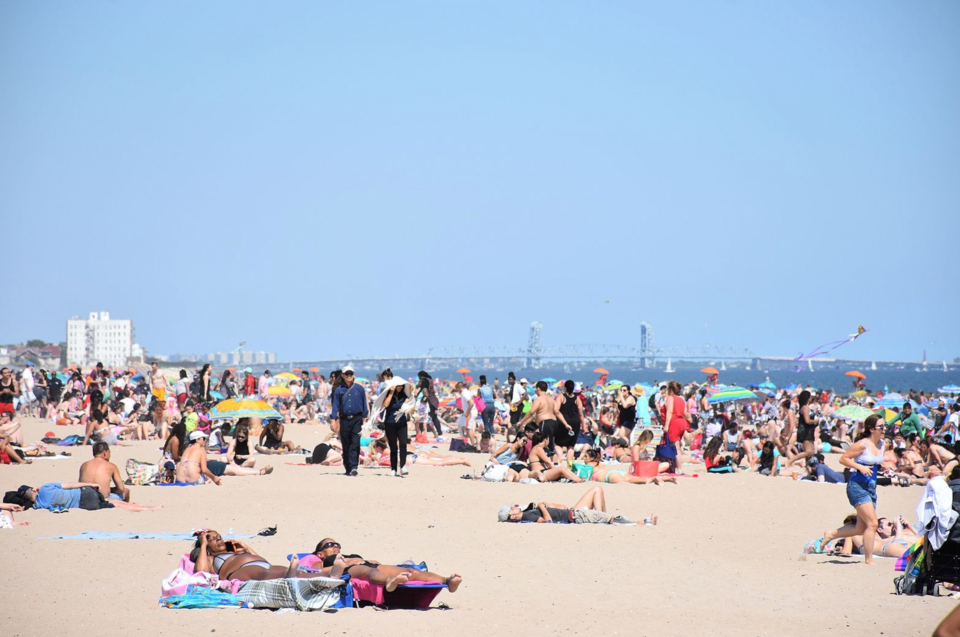New Yorkers could face dangerous heat conditions this week.
Gov. Kathy Hochul said New Yorkers should prepare in advance for high heat and humidity in the forecast on Thursday and Friday, with heat index values — or "feels like" temperatures — of more than 100 degrees in lower elevation areas across the state.
"Extreme heat is posing a significant health risk for New Yorkers, especially for vulnerable populations like children and seniors," Hochul said. "I have directed State agencies to take all necessary precautions to keep New Yorkers safe during this weather event, and will be deploying personnel as necessary. Before the heat hits New York on Thursday, I encourage all New Yorkers to take common-sense precautions: Stay out of the sun, keep yourself hydrated, check on your neighbors and identify a cooling center near you."
Older adults and individuals with chronic diseases are most vulnerable to heat-related illnesses. Factors such as obesity, fever, dehydration, prescription drug use, heart disease, mental illness, poor circulation, sunburn, alcohol use, outdoor work and living in urban areas where pollution may linger on hot days can increase the risk of heat-related illnesses. Prolonged exposure to heat can be harmful and potentially fatal. Call 911 if you or someone you know shows signs or symptoms of heat illness, including headache, lightheadedness, muscle cramps, nausea and vomiting.
To alleviate the impact of extreme heat, there are public air-conditioned locations where residents can cool down, including cooling centers, libraries, shopping malls, and supermarkets. Information about the locations of cooling centers can be found here.
New York State Parks has facilities across the state where the public can go to cool off with swimming at pools and waterbodies or cooling off at spraygrounds. A list of available State Parks swimming facilities is available here.
Be prepared
Taking precautions to avoid heat exhaustion is important, including adjusting your schedule to avoid the outdoors during the hottest hours of the day and modifying your diet and water intake when possible.
- Reduce strenuous activities and exercises, especially during peak sunlight hours.
- Exercise should be conducted early in the morning, before 7:00am
- Eat less protein and more fruits and vegetables. Protein produces and increases metabolic heat, which causes water loss. Eat small meals but eat more often. Do not eat salty foods.
- Drink at least two to four glasses of water per hour during extreme heat, even if you do not feel thirsty. Avoid beverages containing alcohol or caffeine.
- If possible, stay out of the sun and stay in air conditioning. The sun heats the inner core of your body, resulting in dehydration. If air conditioning is not available, stay on the lowest floor, out of the sunshine, or go to a public building with air conditioning.
- If you must go outdoors, wear sunscreen with a high sun protector factor rating (at least SPF 15) and a hat to protect your face and head.
- When outdoors, wear loose-fitting, lightweight, and light-colored clothing. Cover as much skin as possible to avoid sunburn and over-warming effects of sunlight on your body.
- Never leave children, pets or those who require special care in a parked vehicle, especially during periods of intense summer heat. Temperatures inside a closed vehicle can reach over 140 degrees Fahrenheit quickly. Exposure to such high temperatures can kill within a matter of minutes.
- Try to check on your neighbors during a heat wave, especially if they are elderly, have young children or have individual needs. Make sure there is enough food and water for your pets.
Conserve electricity
NYSERDA recommends taking smart steps to reduce energy use, particularly during periods of peak demand, not only helps to lower the state's peak load but also saves consumers money when electricity is the most expensive. To reduce energy use, particularly during peak periods, the public is encouraged to take some of the following low- or no-cost energy-saving measures:
- Close drapes, windows, and doors on your home's sunny side to reduce solar heat buildup.
- Turn off air conditioners, lights, and other appliances when not at home and use a timer to turn on your air conditioner about a half-hour before arriving home. Use advanced power strips to centrally "turn off" all appliances and save energy.
- Fans can make rooms feel 10 degrees cooler and use 80 percent less energy than air conditioners.
- Set your air conditioner at 78 degrees or higher to save on your cooling costs.
- Place your air conditioner in a central window, rather than a corner window, to allow for better air movement.
- Consider placing the unit on the north, east or the best-shaded side of your home. Your air conditioner will have to work harder and use more energy if it is exposed to direct sunlight.
- Seal spaces around the air conditioner with caulking to prevent cool air from escaping.
- Use appliances such as washing machines, dryers, dishwashers and ovens early in the morning or late at night. This will also help reduce humidity and heat in the home.




